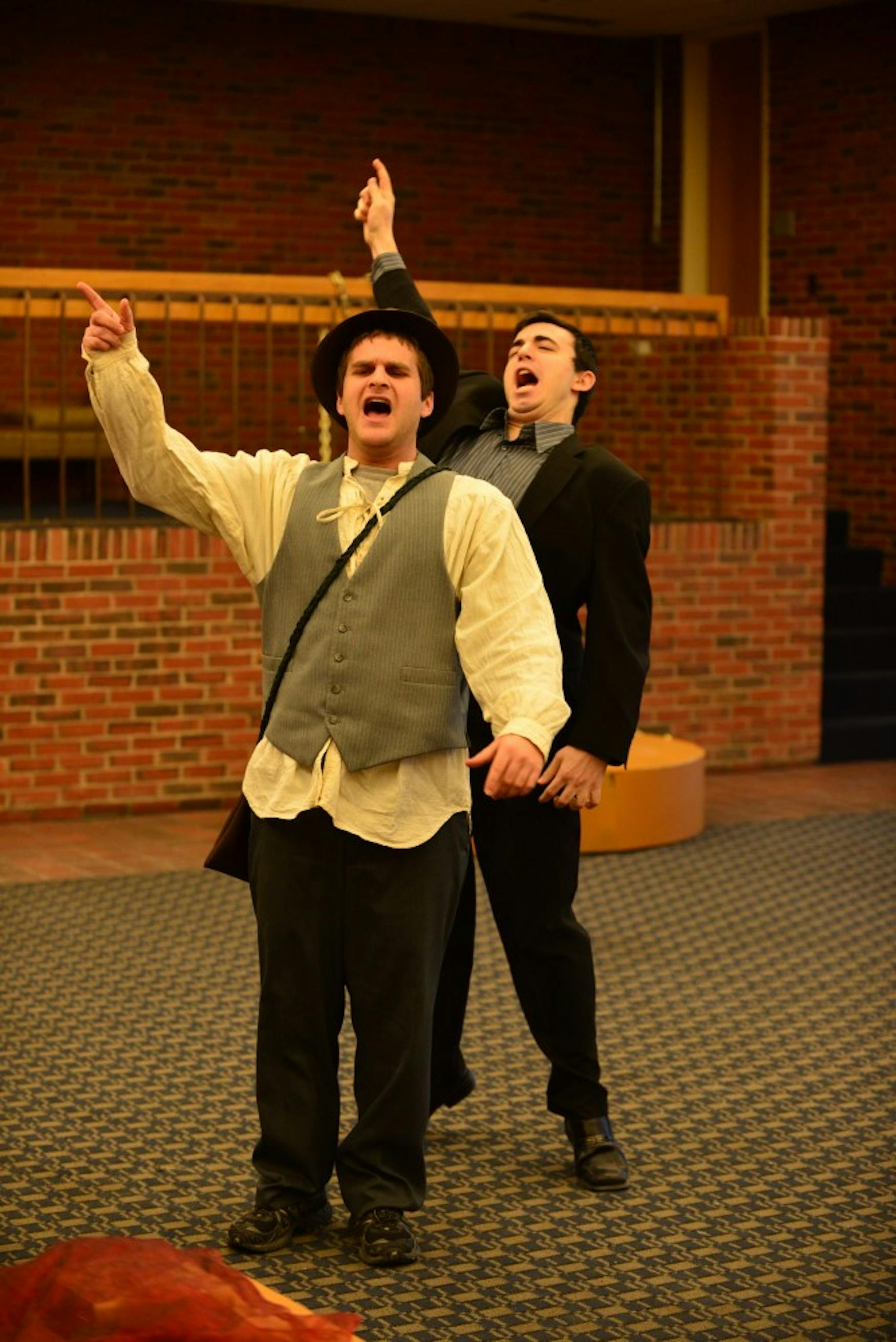Merchant of Venice highlights important social issues
Shakespeare’s The Merchant of Venice raises important questions about the nature of mercy, racism and anti-gay and anti-Semitic attitudes. Shakespeare’s comedy highlights key social issues that retain their relevance today. This weekend, Hold Thy Peace presented a production of The Merchant of Venice that emphasized these issues, as part of ’DEIS Impact. Performances were held in the Usdan International Lounge.
The play followed Bassanio (Phill Skokos ’15), a young Venetian, as he attempted to woo Portia (Barbara Rugg ’15), the rich heiress of Belmont. Being Portia’s suitor was no easy feat; suitors had to prove that they were financially stable and pass a test devised by Portia’s father to determine their worthiness of character.
When Bassanio struggled to pay the suitor’s fee of 3000 ducats, he turned to his friend Antonio (Brian Dorfman ’16), a wealthy merchant. Antonio stepped in to help Bassanio finance a loan from Shylock (Max Moran ’17), a local Jewish merchant. Shylock, concerned about Antonio’s financial credibility, demanded a pound of Antonio’s flesh should he default on the loan. In an email to the Justice, Skokos noted that “this is a show where many of the characters are not paragons of virtue ... and have pretty glaring flaws [and] lay scheme over scheme on each other in the pursuit of money.”
The production, directed by Arielle Keller ’16, was unusual in many ways. Hold Thy Peace used the International Lounge’s raised platform as a part of the stage, which created a unique opportunity: the actors were able to walk up and down the stairs onto the platform, which helped distinguish changes in setting, as well as move around the stage within their scenes in order to help engage every section of the audience.
Toward the platform of the stage were two smaller circular platforms on which the actors stood during their monologues. In a brief speech before the show, Keller mentioned that the platforms represented the scales of justice. One platform was higher than the other, and the characters that occupied the “moral high ground” stood there as they delivered their monologues. For instance, when Antonio went to ask Shylock for a loan, Shylock stood on the higher platform as he addressed and accused Antonio in his famous speech on anti-Semitism and injustice.
The play’s funniest scenes were those involving Lancelot Gobbo (Alex Peters ’18) and Old Gobbo (Connor Wahrman ’17). Old Gobbo, Lancelot’s father, had limited eyesight and made frequent mistakes in identifying his son and his surroundings. Wahrman played the role dramatically, hunching over and speaking with a wavering voice as he ventured into the audience to look for his son.
In an email to the Justice, Wahrman commented on the cast’s relationship. He wrote, “Transparency between cast and crew, as well as good rapport to [accommodate] late additions to the cast, really helped us stick together.” This close relationship was especially apparent in Moran and Rugg’s performances. The two interacted with their fellow characters as they spoke, which made their characters’ interactions look more believable.
The realistic-looking and detailed costumes enhanced the show’s sense of realism. The women in the production wore vibrant, deep-colored dresses, and the men wore the fancy trousers and vests of that era. Shylock wore a dark suit that helped distinguish him as an outsider among the other characters.
One scene in particular fell short in terms of timing and clarity. In this week’s interview column, Keller mentioned: “There’s an opening and closing sequence of the show that isn’t part of the script. … It basically involves different characters having these silent moments while there’s music playing in the room.” This opening montage left the characters’ identities and relationships to one another ambiguous, but Keller noted that it connected to a more impactful scene that ended the play. Keller said, “At the end of the end of the show, [the cast looked] up at the eyes of the figure of justice who’s an imposing force throughout the whole play and is just staring down at the audience, almost, blindfolded.”
In an email to the Justice, Dorfman mentioned: “The chilling end with Lady Justice (aptly nicknamed Justine) staring at those most wronged in the show with her glowing red eyes says that justice, contrary to what we want to believe, is not blind. How do we combat an unjust system? It's difficult to say what we do about that, but we definitely have to start somewhere.”
Editor’s note: Max Moran ’17 is the forum editor of the Justice.



Please note All comments are eligible for publication in The Justice.